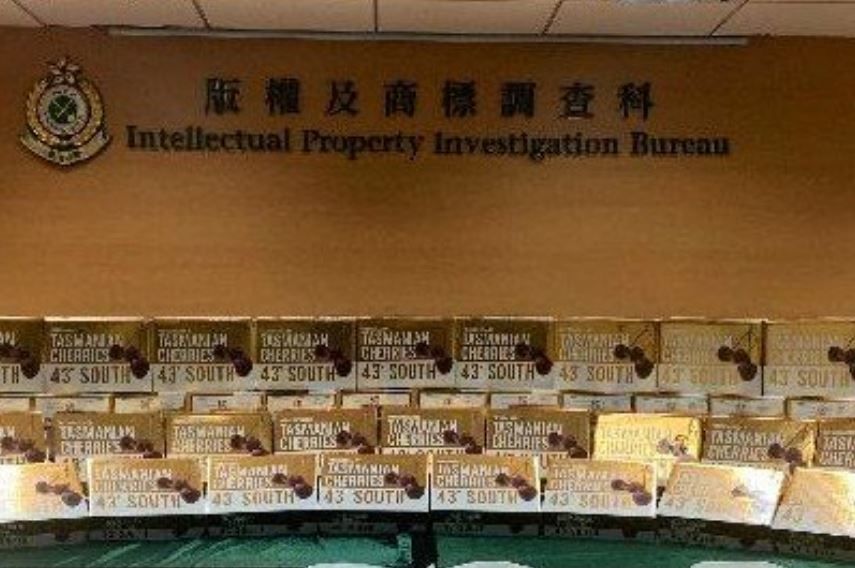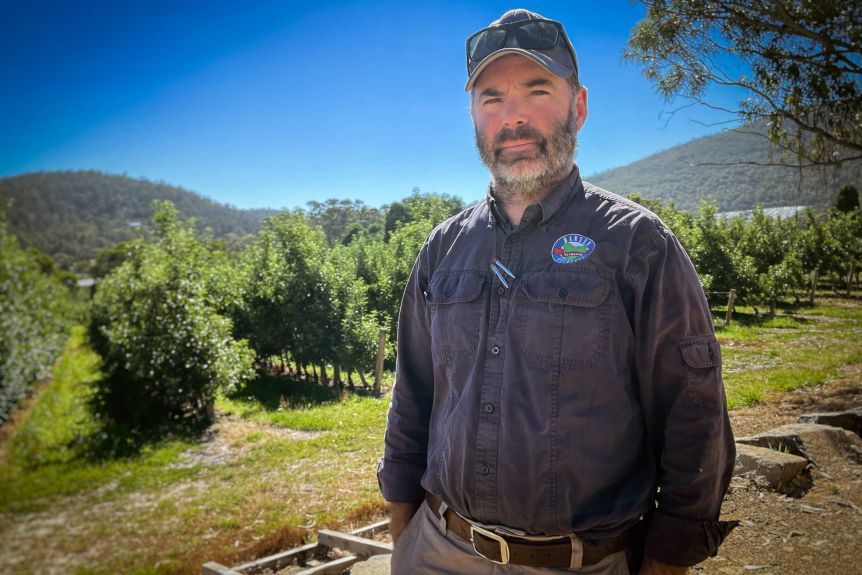Technology is thwarting scammers in Asia after Hong Kong Customs seizes boxes of cherries being falsely marketed as a premium Tasmanian brand.
 Tasmanian grower Howard Hansen said the boxes looked identical to his company's but did not have the unique QR code.
Tasmanian grower Howard Hansen said the boxes looked identical to his company's but did not have the unique QR code.
A Tasmanian cherry producer believes technology is finally starting to thwart counterfeiters in Asia, where lower grade cherries from outside Australia are being packed in boxes imitating premium Australian brands.
Last Thursday Hong Kong Customs seized 196 boxes of cherries labelled as Tasmanian grown and packaged in boxes imitating Howard Hansen's 43 Degrees South brand.
In a statement, Customs said it arrested a 41-year-old saleswoman during a raid on a fruit shop and seized the suspected counterfeit-branded cherries, which weighed about 400 kilograms and had an estimated market value of HK$80,000, or about $13,400.
Customs had received information alleging a shop was "suspected of selling counterfeit-branded cherries."
A batch of suspected counterfeit-branded cherries and packing materials was seized from a fruit shop in Yau Ma Tei.
Tasmanian grower Howard Hansen said the boxes looked identical to his company's but did not have the unique QR code.
"Counterfeiting of our brand is something that's been going on in advance of 15 years, but now with the traceability and unique identification numbers using QR codes that are on the carton, that's something that they aren't able to replicate," he said.
The statement from Hong Kong Customs said investigations were ongoing.
"Customs is looking into the source of the cherries involved in the case and samples will be sent to the Government laboratory for safety testing," the statement said.
"With the Lunar New Year around the corner, Customs will continue to step up inspections and enforcement to combat the sale of counterfeit goods and festive counterfeit food items before and during the holiday."
Fake QR codes alerted producer to fraudulent activity
 Tasmanian grower Howard Hansen says counterfeiting of his brand has been going on for 15 years.
Tasmanian grower Howard Hansen says counterfeiting of his brand has been going on for 15 years.
Mr Hansen's cherries are much sought after in Asian markets, particularly in the lead up to Chinese New Year, making them highly attractive to counterfeiters.
"There's such a commercial opportunity for them," he said.
"They're probably able to buy Chilean cherries in the market for less than 10 per cent of our cherries, and so if they then place those Chilean cherries into a counterfeit carton and trick consumers into paying the full price, they're making a lot of money."
He said counterfeiters went to extraordinary lengths to replicate his packaging, copying logos, seals and pictures.
"It's almost impossible to tell them apart," he said.
"The only thing they weren't able to replicate — there's a photo of some cherries on our 43 Degrees South carton and it's got a reflection in the cherry and the counterfeit cartons didn't have the reflection but we wouldn't have picked it up without the QR code bringing it to our attention in the first place."
He said every single carton had a unique code on it, which end consumers could scan to check the cherries' origin.
"So when an individual QR code kept popping up and it was one that wasn't generated by us, that alerted us that there was some fraudulent activity going on, and then our representatives in Hong Kong were able to bring that to the attention of local authorities and take the action that we've seen the result of," he said.
Mr Hansen said he was pleased that the technology has finally caught up and is catching counterfeiters.
"With the extra identification and traceability on the carton, I think we're going to be able to make prosecutions a lot more regularly if it keeps occurring," he said.
In Hong Kong, selling or possessing goods with a forged trademark carries a maximum penalty of five years' imprisonment and a fine of $500,000.
Mr Hansen is calling for the maximum penalty to be applied to help deter the practice.















